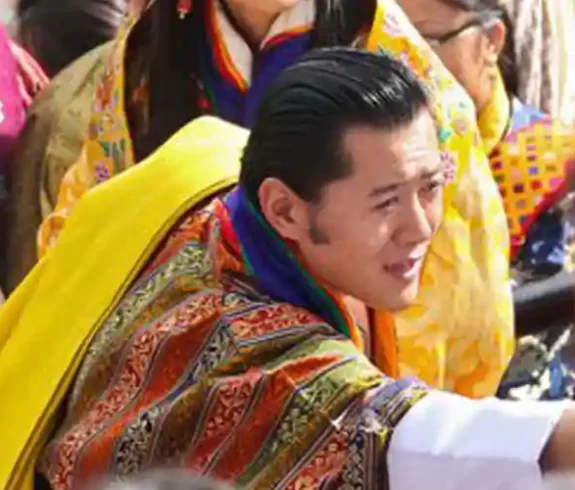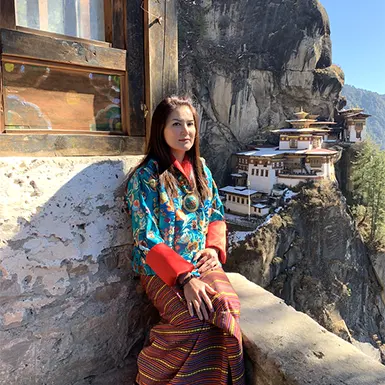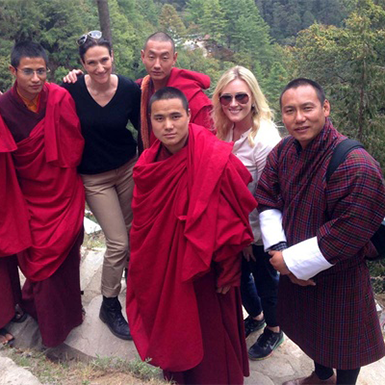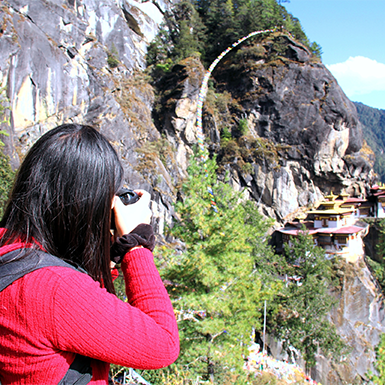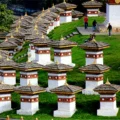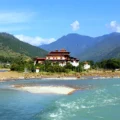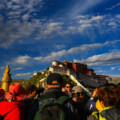Jigme Dorji Wangchuck (1928-1972), the Third Druk Gyalpo or Dragon King of Bhutan, is celebrated as the father of modern Bhutan. His reign from 1952 to 1972 profoundly transformed the Himalayan kingdom. His visionary leadership introduced significant modernization efforts while respecting the nation’s cultural traditions.
A Reign of Reform and Progress
King Jigme Dorji Wangchuck was a visionary leader who recognized the need for Bhutan to adapt and modernize while preserving its unique cultural identity. Numerous groundbreaking initiatives characterized his reign.
- Opening Bhutan to the World: The King initiated Bhutan’s cautious opening to the international community, establishing diplomatic relations with other countries and joining the United Nations in 1971. This development marked a pivotal step in Bhutan’s engagement with the global stage.
- Modernizing Infrastructure: Bhutan launched an ambitious infrastructure development program under his leadership. He constructed new roads to connect previously isolated regions and made primary healthcare and education more accessible to the population.
- Economic Development: Third, Druk Gyalpo laid the foundation for Bhutan’s economic development. He introduced planned economic policies and encouraged sustainable growth, paving the way for a prosperous future.
- Cultural Preservation: While embracing modernity, the King remained deeply committed to preserving Bhutan’s rich cultural heritage. He championed the arts, supported traditional practices, and ensured that Bhutan’s unique identity remained intact.

A Lasting Legacy
Today, Jigme Dorji Wangchuck’s lessons continue to be visible in Bhutan. One of these teachings is that Gross National Happiness (GNH) should be treated as opposed to Gross Domestic Product (GDP) when assessing well-being at the national level in Bhutan. In addition, his efforts towards preserving the environment made Bhutan emerge as one of the few countries globally known for its commitment to sustainable development.
Explore the Formative Years of Jigme Dorji Wangchuck: Shaping the Future of Bhutan
Discover Jigme Dorji Wangchuck’s early life and educational tour and understand how they shaped his transformative approach to Bhutan’s development.
Early Life and Background
Jigme Dorji Wangchuck, born into Bhutan’s royal family, was destined to lead and transform the nation. From a young age, he navigated a world where deep-rooted traditions met dynamic governance and leadership, setting the stage for his future efforts to modernize Bhutan while upholding its cultural values.
Education and Influences
Receiving his education in Bhutan and overseas allowed Third Druk Gyalpo to gather a wide range of experiences that expanded his worldview. Beyond traditional academics, his extensive travels and meetings with global leaders brought him into contact with modern ideas and governance models, which he skillfully adapted to meet Bhutan’s unique needs.
Vision for Bhutan
His broadened perspectives from education and travel were pivotal in forming his vision for Bhutan, a nation connected to the world yet deeply rooted in its cultural heritage. His initiatives combined modernization with a solid commitment to environmental conservation and preserving Bhutanese culture.
Navigating Through His Legacy
Today’s visitors to Bhutan can witness the enduring impact of his vision. The educational reforms and infrastructural developments he championed have advanced generations and made the nation’s remote areas more accessible. When planning your visit, explore the academic institutions and infrastructural achievements that reflect his forward-thinking legacy.
A King’s Vision for a New Bhutan
Jigme Dorji Wangchuck, often referred to as the “Father of Modern Bhutan,” was a transformative figure in the history of the Himalayan Kingdom. His reign, marked by his ascension to the throne in 1952 and the subsequent challenges he faced, laid the groundwork for Bhutan’s modernization and development.
A Prepared Heir
Starting in 1928, mentors groomed Jigme Dorji Wangchuck for leadership from a young age. Educated both in Bhutan and abroad, he gained exposure to different cultures and systems of governance. This experience would prove invaluable as he took on the mantle of kingship.
Ascending the Throne in a Time of Transition
Jigme Dorji Wangchuck ascended to the throne in 1952 at 23, following his father’s death, King Jigme Wangchuck. The young King inherited a country isolated mainly from the outside world and steeped in traditional practices. However, the global political landscape was shifting, and Bhutan faced new pressures to engage with its neighbors and the international community.
Challenges and Opportunities
A series of internal and external challenges marked the early reign of Third Druk Gyalpo:
- Internal Modernization: The King recognized the need to modernize Bhutan’s infrastructure, education, and healthcare systems. He initiated reforms to abolish serfdom and introduce a modern legal system.
- Geopolitical Concerns: Bhutan’s location between India and China posed geopolitical challenges. The King had to navigate delicate relationships with both powerful neighbors while safeguarding Bhutan’s sovereignty.
- Cultural Preservation: While advocating for modernization, Jigme Dorji Wangchuck understood the importance of preserving Bhutan’s unique cultural identity. He sought to balance progress with tradition.
A Visionary King
People remember Jigme Dorji Wangchuck for his visionary leadership and unwavering commitment to Bhutan’s development. During his reign, he established the National Assembly, introduced a modern education system, and constructed roads and hospitals. He also opened Bhutan to limited tourism, allowing the world to glimpse the Kingdom’s stunning landscapes and rich culture.
A Legacy of Modernization in Bhutan
In 1952, Jigme Dorji Wangchuck ascended to the throne as Bhutan’s third Druk Gyalpo (Dragon King). His reign, marked by ambitious reforms and a dedication to progress, transformed the Kingdom from an isolated and traditional society into a developing nation poised for the modern world.
The Blueprint for Modernization
Jigme Dorji Wangchuck’s vision for modernization was comprehensive, encompassing various sectors:
- Infrastructure Development: Recognizing the need to connect Bhutan’s isolated regions, the King initiated the construction of a nationwide road network. This ambitious project opened up opportunities for trade, communication, and access to essential services.
- Healthcare and Education: Jigme Dorji Wangchuck prioritized his people’s health and education. He oversaw the construction of hospitals and clinics nationwide, making healthcare accessible to even the most remote communities. Additionally, he established schools and introduced a modern curriculum, laying the foundation for Bhutan’s future workforce.
- Economic Reforms: Jigme Dorji Wangchuck introduced a planned economy to stimulate economic growth. He founded the National Assembly of Bhutan, moving towards a more democratic governance system, and promoted the development of agriculture and industry.
The National Assembly: A Voice for the People
Establishing the National Assembly in 1953 marked a significant milestone in Bhutan’s political development. It provided a platform for Bhutanese citizens to participate in decision-making and have a voice in the country’s governance. Jigme Dorji Wangchuck’s commitment to democracy laid the groundwork for Bhutan’s unique form of constitutional monarchy.
A King’s Enduring Impact
Jigme Dorji Wangchuck’s modernization efforts fundamentally changed Bhutan. People remember his reign’s transformative impact on infrastructure, education, healthcare, and governance. The King’s commitment to his people’s well-being and visionary leadership propelled Bhutan into the modern era while maintaining its distinct cultural identity.
Champion of Political Reform and Modern Governance in Bhutan
Beyond his efforts in modernization, Jigme Dorji Wangchuck spearheaded significant political reforms that reshaped Bhutanese society and its system of governance. His reign marked a pivotal moment in Bhutan’s history, characterized by a strong focus on social justice, economic equity, and the gradual democratization of the Kingdom.
A New Era of Social Justice Begins
One of Jigme Dorji Wangchuck’s first acts as King was to abolish serfdom, a centuries-old feudal system that had tied many Bhutanese to landowners. This momentous decision liberated a large population segment and laid the groundwork for increased social equality.
Recognizing the need for a legal system aligned with modern values, the King initiated a comprehensive overhaul of the judiciary. He introduced new laws and codes based on contemporary legal practices to ensure fairness, safeguard individual rights, and uphold the rule of law.
Economic Reforms for a More Equitable Society
Jigme Dorji Wangchuck implemented a new taxation system based on income rather than traditional land ownership to foster a more equitable society. This shift aimed to alleviate the financial burden on farmers and distribute taxes more evenly across the population.
The King also tackled disparities in land ownership through land reforms. He redistributed land to landless peasants and implemented measures to prevent excessive land accumulation by a few wealthy individuals. These reforms sought to create a more balanced and just economic landscape.
Fostering Democratic Governance
Jigme Dorji Wangchuck firmly believed in the importance of citizen participation in governance. He introduced measures to decentralize power, devolving some administrative authority to local governments. It fostered greater regional autonomy and ensured that decisions impacting communities were made by those who understood their needs best.
The King’s most notable contribution to Bhutan’s political development was the establishment of the National Assembly in 1953. This elected body provided a platform for Bhutanese citizens to make decisions and contribute to their country’s future. While not a full democracy, it represented a crucial step towards increased political participation and representation.
An Enduring Legacy
Jigme Dorji Wangchuck’s political reforms continue to shape Bhutan’s governance today. His focus on social justice, economic fairness, and democratic participation laid the foundation for the country’s unique form of constitutional monarchy. His legacy is an enduring inspiration for Bhutanese leaders and citizens alike, underscoring the importance of progressive leadership, the rule of law, and the empowerment of citizens in building a just and prosperous society.
A King’s Devotion to Cultural Preservation and Social Advancement
While his political and economic reforms transformed Bhutan, Jigme Dorji Wangchuck remained deeply committed to safeguarding the country’s unique cultural heritage and advancing the social well-being of his people. His reign was marked by a harmonious blend of tradition and progress, ensuring that Bhutan’s cultural identity remained vibrant while the nation embraced modernity.
Preserving Bhutanese Culture and Traditions
- Championing Traditional Arts and Crafts: Jigme Dorji Wangchuck actively supported traditional Bhutanese arts and crafts, recognizing their importance in preserving the nation’s cultural heritage. He encouraged the practice of conventional weaving, painting, sculpture, and music, ensuring that these art forms continued to thrive.
- Protecting Religious Heritage: As a devout Buddhist, the King was deeply committed to safeguarding Bhutan’s rich religious heritage. He oversaw the restoration and preservation of ancient monasteries, dzongs (fortresses), and temples, ensuring that these sacred sites remained vibrant centers of spiritual and cultural life.
- Promoting Bhutanese Dress and Etiquette: Jigme Dorji Wangchuck encouraged wearing traditional Bhutanese dress, such as the go for men and the Kira for women, to express national identity. He also emphasized the importance of maintaining conventional Bhutanese etiquette and customs.
Improving Healthcare and Education
- Expanding Access to Healthcare: Recognizing the importance of healthcare for his people, Jigme Dorji Wangchuck oversaw the expansion of medical facilities throughout the country. He established hospitals, clinics, and dispensaries, ensuring that healthcare reached even the most remote communities. He also initiated programs to combat diseases like malaria and tuberculosis.
- Modernizing the Education System: Jigme Dorji Wangchuck believed education was crucial for Bhutan’s development. He initiated the modernization of the education system, introducing secular schools alongside traditional monastic education. He also established scholarships for Bhutanese students to study abroad, fostering a generation of educated leaders.
Fostering National Identity and Unity
- Celebrating National Day (Druk Gyalsey): Jigme Dorji Wangchuck established National Day (Druk Gyalsey) as a national holiday to strengthen national identity and unity. This annual celebration commemorates the coronation of Bhutan’s first king and serves as a reminder of the country’s shared history and values.
- Promoting Dzongkha as the National Language: The King championed using Dzongkha, Bhutan’s national language, as a unifying force for the country’s diverse ethnic groups. He encouraged its use in education, government, and media, ensuring it remained a central part of Bhutanese identity.
A Visionary Leader’s Impact on Bhutan’s Foreign Relations
The Third King of Bhutan, Jigme Dorji Wangchuck, is revered for his transformative leadership and unwavering commitment to his nation’s progress. His reign marked a pivotal shift in Bhutan’s foreign policy, introducing the Himalayan kingdom to the global stage while maintaining its unique identity and values.
A New Era of Diplomatic Relations
Under Jigme Dorji Wangchuck’s astute guidance, Bhutan emerged from its self-imposed isolation and actively sought diplomatic relations with other nations. It departed from the Kingdom’s traditional policy of limited interaction with the outside world. The King recognized the importance of international cooperation for Bhutan’s development and security.
Forging Ties with India
Jigme Dorji Wangchuck’s most significant diplomatic achievement was establishing strong and enduring ties with India. The two nations signed the Indo-Bhutan Treaty of Friendship in 1949, which laid the foundation for a close and mutually beneficial relationship. This treaty provided Bhutan with vital security assurances and facilitated economic cooperation.
The King’s relationship with Indian leaders, such as Jawaharlal Nehru, strengthened bilateral ties. He visited India numerous times, fostering goodwill and understanding between the two countries.
Bhutan’s Entry into the United Nations
Jigme Dorji Wangchuck’s vision for Bhutan extended beyond regional diplomacy. He recognized the importance of multilateral engagement and actively sought Bhutan’s membership in the United Nations. In 1971, Bhutan became a full member of the UN, marking a historic milestone for the Kingdom.
This move allowed Bhutan to participate in global discussions on issues of common concern, such as peace, security, and development. It also provided the Kingdom a platform to advocate for its unique Gross National Happiness development philosophy.
Legacy and Continued Impact
Jigme Dorji Wangchuck’s legacy in foreign relations continues to shape Bhutan’s diplomatic approach. The Kingdom maintains strong ties with India while actively engaging with other nations and international organizations. Bhutan’s foreign policy is committed to peace, cooperation, and sustainable development.
The King’s vision for a modern Bhutan, open to the world but firmly rooted in its cultural heritage, remains a guiding principle for the nation’s leaders and diplomats. Jigme Dorji Wangchuck’s contributions to Bhutan’s foreign relations have ensured the Kingdom’s place in the international community and paved the way for its continued progress.
A King’s Vision for Environmental Conservation in Bhutan
Jigme Dorji Wangchuck, the Third King of Bhutan, is celebrated for his diplomatic prowess and deep-rooted commitment to environmental conservation. His reign marked a pivotal moment in Bhutan’s ecological history, establishing a legacy of sustainable development that continues to inspire the nation.
A Vision for Environmental Conservation
Far ahead of his time, Jigme Dorji Wangchuck recognized the intrinsic value of Bhutan’s pristine natural environment. He understood the delicate balance between economic development and ecological preservation. His vision for Bhutan was one where progress did not come at the cost of the environment but rather in harmony with it.
This forward-thinking approach led to the implementation of numerous environmental initiatives during his reign. The King prioritized the conservation of Bhutan’s rich biodiversity, recognizing it as a national treasure and a global asset.
Establishing Protected Areas and National Parks
One of Jigme Dorji Wangchuck’s most enduring legacies is establishing a network of protected areas and national parks across Bhutan. These protected areas encompass diverse ecosystems, from lush forests to towering mountains and glacial valleys.
Creating these parks was not merely an act of preservation but a conscious decision to integrate conservation into Bhutan’s development model. They serve as vital habitats for endangered species, including the snow leopard, Bengal tiger, and red panda. Moreover, these protected areas are also a source of livelihood for local communities, who benefit from sustainable tourism and resource management practices.
Influencing Bhutan’s Environmental Policies
The environmental principles espoused by Jigme Dorji Wangchuck continue to underpin Bhutan’s current environmental policies. The Kingdom’s commitment to Gross National Happiness, a holistic development philosophy that prioritizes well-being over material wealth, is deeply intertwined with ecological conservation.
Bhutan’s constitution requires that at least 60% of its land remains forested. The country has also committed to staying carbon neutral, establishing itself as a global leader in environmental sustainability. These policies are a testament to Jigme Dorji Wangchuck’s enduring influence and visionary environmental protection approach.
Jigme Dorji Wangchuck’s Enduring Legacy: Shaping Modern Bhutan
Jigme Dorji Wangchuck significantly transformed Bhutan, laying the foundation for its modern development. Through his visionary leadership, he brought about crucial reforms in infrastructure, education, healthcare, and governance. These changes modernized the nation while preserving its cultural heritage, ensuring that Bhutan’s unique identity remained intact as it progressed into the future. His enduring legacy continues to influence Bhutanese society, making him a revered historical figure.
A Legacy of Modernization
Jigme Dorji Wangchuck initiated a series of ambitious reforms to modernize Bhutan while preserving its unique cultural identity. He recognized the importance of education and healthcare for the nation’s development and invested heavily in these sectors.
Under his rule, Bhutan established its first modern schools, hospitals, and infrastructure projects. These initiatives improved the quality of life for the Bhutanese people and set the stage for further progress.
Democratization and Decentralization
The King was also a proponent of democratization and decentralization. He believed in empowering local communities and giving them a voice in governance. His reforms established local government bodies and devolved power to the grassroots level.
These reforms not only strengthened Bhutan’s democracy but also fostered a sense of ownership and participation among the Bhutanese people. They played a crucial role in building a cohesive and resilient society.
Economic Development and Self-Reliance
Jigme Dorji Wangchuck understood the importance of economic development for Bhutan’s future. He sought to reduce the Kingdom’s dependence on foreign aid and promote self-reliance.
His initiatives led to various economic policies to diversify the economy and boost domestic production. These efforts laid the foundation for Bhutan’s steady economic growth and current status as a middle-income country.
Reflections by Current Leaders and Historians
Bhutanese society deeply ingrains Jigme Dorji Wangchuck’s legacy in its consciousness. Current leaders and historians alike recognize his pivotal role in shaping modern Bhutan.
His Majesty Jigme Khesar Namgyel Wangchuck, the current King of Bhutan, has often praised his grandfather’s legacy with reverence and admiration. He has emphasized the importance of continuing the work started by Jigme Dorji Wangchuck to build a prosperous and happy nation.
Historians have praised the King’s visionary leadership and ability to navigate modernization challenges while preserving Bhutan’s unique cultural heritage. They view his reign as a turning point in Bhutan’s history, setting the stage for the country’s remarkable progress in recent decades.
Jigme Dorji Wangchuck: A Glimpse into the King’s Personal Life and Values
While people celebrate Jigme Dorji Wangchuck’s reign for its transformative reforms, his personal life offers valuable insights into the man behind the monarch. He was a visionary leader and a compassionate and conscientious individual who deeply admired his people and profoundly respected Bhutan’s cultural heritage.
A Humble Upbringing and Early Life
Jigme Dorji Wangchuck was born in 1928 in the Thruepang Palace in Trongsa, steeped in Bhutanese traditions. He received a comprehensive education in Bhutan and abroad, exposing him to various ideas and cultures. This early exposure laid the foundation for his progressive outlook and commitment to modernizing Bhutan while preserving its unique identity.
A Devoted Family Man
Jigme Dorji Wangchuck was a devoted family man who cherished his wife, Ashi Kesang Choden Wangchuck, and their four children. He was known for his close relationship with his family and active involvement.
The King’s family life reflected his commitment to traditional Bhutanese values. He instilled in his children a strong sense of duty, compassion, and respect for their cultural heritage. This legacy of family values continues to resonate in Bhutan today.

Anecdotes and Stories: A Glimpse into His Character
Numerous anecdotes and stories offer glimpses into Jigme Dorji Wangchuck’s character and values. He was known for his humility, accessibility, and genuine concern for the well-being of his people.
One such story recounts how the King would often travel incognito to remote villages to understand the challenges faced by his subjects firsthand. He would converse with villagers, listen to their concerns, and offer solutions. This personal connection with his people earned him their unwavering trust and respect.
Another anecdote highlights the King’s love for nature and his passion for conservation. He was an avid outdoorsman who enjoyed trekking in the mountains and exploring Bhutan’s pristine wilderness. His deep appreciation for nature undoubtedly influenced his strong commitment to environmental protection.
Honoring Jigme Dorji Wangchuck: Monuments, Awards, and National Celebrations
The legacy of Jigme Dorji Wangchuck, the Third King of Bhutan, is deeply ingrained in the nation’s cultural fabric. People continue to celebrate his visionary leadership and transformative reforms through various monuments, awards, and national holidays that honor his contributions to Bhutan’s development and progress.
Monuments and Memorials
Several iconic monuments and memorials stand as testaments to Jigme Dorji Wangchuck’s enduring legacy:
- National Memorial Chorten: Situated in central Thimphu, the National Memorial Chorten is a significant landmark and spiritual hub for the Bhutanese people. Ashi Phuntsho Choden Wangchuck, the King’s mother, commissioned it in 1974 as a tribute to her son’s life and accomplishments. The corten’s intricate design and religious significance make it a popular pilgrimage site for Buddhists worldwide.
- Jigme Dorji Wangchuck National Referral Hospital: The largest hospital in Bhutan, named after the King, symbolizes his commitment to improving healthcare for his people. It provides essential medical services to the Bhutanese population and is a testament to the King’s vision for a modern and healthy Bhutan.
- Jigme Dorji Wangchuck Statue: A prominent statue of the King graces the entrance of the National Assembly building in Thimphu. This imposing figure reminds visitors of his role in establishing Bhutan’s democratic institutions and his commitment to good governance.
Awards and Honors
Authorities have instituted several awards and honors in Jigme Dorji Wangchuck’s name to recognize his outstanding contributions:
- Jigme Dorji Wangchuck Medal: Authorities award this prestigious medal to individuals who have contributed exceptionally to Bhutan’s development in various fields, including education, healthcare, and environmental conservation. It is the highest civilian honor bestowed by the Bhutanese government.
- Jigme Dorji Wangchuck Scholarship: This scholarship financially assists outstanding Bhutanese students pursuing higher education abroad. Its goal is to foster upcoming leaders who will advance the nation’s ongoing development.
National Holidays and Celebrations
Bhutan celebrates several national holidays to commemorate Jigme Dorji Wangchuck’s life and contributions:
- The King’s Birth Anniversary: May 2nd is a national holiday in Bhutan to mark Jigme Dorji Wangchuck’s birth anniversary. It is a day of reflection and gratitude for his leadership and enduring legacy.
- Coronation Day: October 27th commemorates the day Third Druk Gyalpo ascended to the throne in 1952. This national holiday reminds the King of his commitment to serving his people and his vision for a modern Bhutan.
A Legacy of Visionary Leadership: Jigme Dorji Wangchuck’s Enduring Impact on Bhutan
Jigme Dorji Wangchuck’s reign is a transformative era in Bhutanese history. His visionary leadership and tireless efforts paved the way for a modern Bhutan that thrives today. The very fabric of Bhutanese society embodies his legacy, shaping the nation’s present and guiding its future.
Summary of Contributions
Jigme Dorji Wangchuck’s contributions to Bhutan are vast and far-reaching. He modernized the country’s infrastructure, established democratic institutions, championed environmental conservation, and fostered economic development. He led Bhutan out of isolation, forging diplomatic relations with other nations and securing Bhutan’s place in the international community.
The King’s commitment to education, healthcare, and the well-being of his people laid the groundwork for Bhutan’s impressive progress in these areas. His emphasis on preserving Bhutan’s unique cultural identity ensured that modernization did not come at the cost of tradition.
Continued Relevance in Present-Day Bhutan
Jigme Dorji Wangchuck’s reforms and vision remain highly relevant in present-day Bhutan. The foundations he laid for modernization, democracy, and sustainable development continue to guide the nation’s policies and initiatives.
His emphasis on Gross National Happiness, a holistic development philosophy that prioritizes well-being over material wealth, has become a guiding principle for Bhutan’s development model. The King’s legacy of environmental stewardship is evident in Bhutan’s commitment to conservation and its status as a carbon-neutral country.
